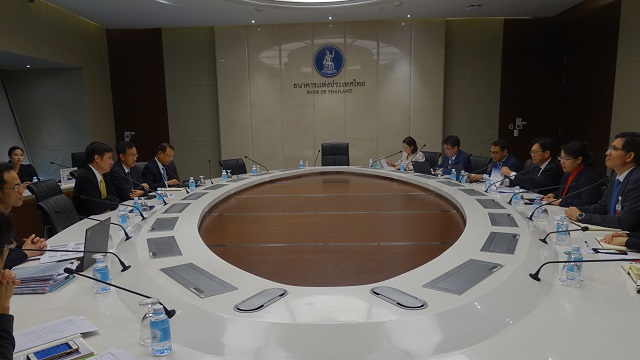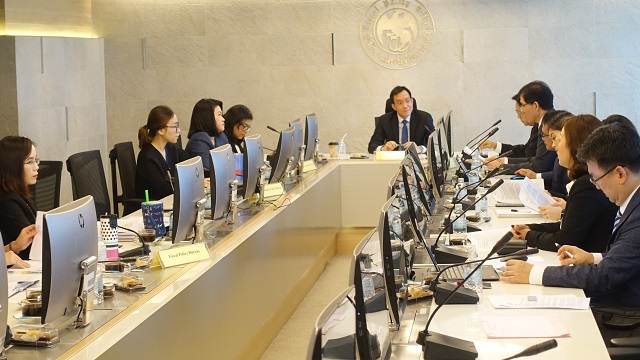
AMRO mission team in the wrap-up meeting with Bank of Thailand Deputy Governor Mr. Mathee Supapongse
SINGAPORE, June 14, 2018 – Thailand’s economy continues to gain traction, but further structural reforms are needed to continue developing the economy’s growth potential and to cope with the rapid pace of aging, according to the preliminary assessment by the ASEAN+3 Macroeconomic Research Office (AMRO) after its Annual Consultation Visit to the country from June 4 to 12, 2018.
The mission was led by AMRO Lead Economist Dr Jae Young Lee, and participated by Director Dr Junhong Chang and Chief Economist Dr Hoe Ee Khor. Discussions focused on the growth prospects, risks, vulnerabilities and challenges, the appropriate monetary and fiscal policies to sustain and enhance growth, and structural reforms
“Led by strong exports and tourism, Thailand’s economy grew by 3.9 percent in 2017 and is projected to expand by 4.2 percent in 2018 before moderating to 4.0 percent in 2019,” said Dr Lee. “Efforts to increase potential growth should be continued and a coordinated package of reforms is necessary in order to cope with the rapid pace of aging.”
Growth in the first quarter of 2018 reached 4.8 percent. Going forward, the economy is expected to maintain its strong growth momentum. The contributions from external and domestic drivers are expected to be more balanced.
The external position has continued to strengthen, underpinned by the large current account surplus and substantial international reserves. Financial institutions remain sound with strong capital buffers and high loan-loss reserves. The overall fiscal policy has been expansionary in support of the economy.
Downside risks to growth stem mainly from possible escalation of trade protectionism, and domestic political uncertainties. A faster-than-expected pace of the U.S. rate hike could lead to capital flow volatility. Risks to financial stability remain contained, although some pockets of risks remain, in particular, the still high household debt to GDP ratio, albeit slowing down.

AMRO mission team in the wrap-up meeting with Mr. Warothai Kosolpisitkul, Fiscal Policy Advisor, Fiscal Policy Office, Ministry of Finance
Fiscal policy should be directed towards infrastructure investment and structural reforms in order to lift the growth potential and enhance the social security system to prepare for the aging population. The government’s thrust for mega-infrastructure projects is a welcome development, and should be expedited and executed in a timely and well-coordinated manner to crowd in private investment and to enhance potential growth. Public infrastructure management should be strengthened further to improve efficiency and effectiveness of public investment. To support the infrastructure drive and expansionary fiscal policy, it is important to improve the buoyancy of the tax system.
The current monetary policy stance is appropriate in supporting growth and financial stability. Maintaining financial stability in the prolonged period of low interest rate environment can be addressed through a set of well-coordinated policy instruments that include monetary policy, macroprudential regulation, and coordination with other agencies. The search-for-yield behavior associated with the low interest rate environment requires continued monitoring and should be supported by a financial literacy campaign, to ensure that retail investors are well informed and not taking excessive risks.
Thailand is aging at a relatively fast pace, with significant decline in fertility rates, and is at risk of getting old before getting rich. A coordinated package of reforms is necessary in order to cope with this issue, including extending the retirement age, mobilizing previously untapped talents in the countryside, and encouraging high-skilled migration. The 20-year Strategic Plan, including Thailand 4.0 scheme and the flagship project of Eastern Economic Corridor, is a welcome move. The multiplier effects from EEC to other regions in the country should also be enhanced to promote inclusive growth and reduce inequality. To further strengthen private investment, services sector can be liberalized further.
AMRO would like to express its appreciation to the Thai authorities and other counterparts for their excellent cooperation and warm hospitality. The consultation visit has deepened AMRO’s understanding of the current macroeconomic and financial situation, the macroeconomic and fiscal policy framework, as well as structural reforms in Thailand.
About AMRO:
The ASEAN+3 Macroeconomic Research Office (AMRO) is an international organization, established to contribute to securing the economic and financial stability of the ASEAN+3 region, which includes 10 members of the Association of Southeast Asian Nations (ASEAN) and China; Hong Kong, China; Japan; and Korea. AMRO fulfills its mandate by conducting regional macroeconomic surveillance, supporting the implementation of the Chiang Mai Initiative Multilateralisation (CMIM), and providing technical assistance to its members.
